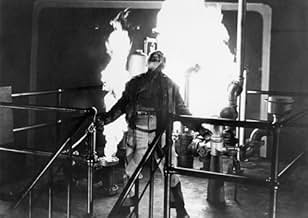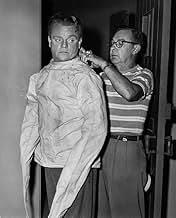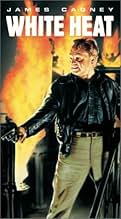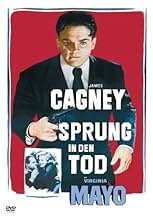A psychopathic criminal with a mother complex makes a daring break from prison and leads his old gang in a chemical plant payroll heist.A psychopathic criminal with a mother complex makes a daring break from prison and leads his old gang in a chemical plant payroll heist.A psychopathic criminal with a mother complex makes a daring break from prison and leads his old gang in a chemical plant payroll heist.
- Nominated for 1 Oscar
- 1 win & 2 nominations total
Joel Allen
- Operative
- (uncredited)
Claudia Barrett
- Cashier
- (uncredited)
Ray Bennett
- Guard
- (uncredited)
Marshall Bradford
- Chief of Police
- (uncredited)
Chet Brandenburg
- Convict
- (uncredited)
John Butler
- Motorist at Gas Station
- (uncredited)
Robert Carson
- Agent at Directional Map
- (uncredited)
Bill Cartledge
- Car-Hop at Drive-In Theatre
- (uncredited)
Bill Clark
- Guard
- (uncredited)
Leo Cleary
- Railroad Fireman
- (uncredited)
- Director
- Writers
- All cast & crew
- Production, box office & more at IMDbPro
Storyline
Did you know
- TriviaThe character of Cody Jarrett was based on New York murderer Francis Crowley, who engaged in a pitched battle with police in the spring of 1931 at the age of 18. Before his execution in the electric chair on 1/21/32, Crowley's last words were, "Send my love to my mother."
- GoofsThe gas station attendant removes the radiator cap with his bare hand.
- Quotes
Cody Jarrett: Made it, Ma! Top of the world!
- Crazy creditsMax Steiner altered the Warner Brothers familiar introductory theme to segue directly into his theme for the opening credits,
- Alternate versionsAlso Available in a Colorized Version.
- ConnectionsEdited into Dead Men Don't Wear Plaid (1982)
- SoundtracksFive O'Clock Whistle
(1940) (uncredited)
Music by Josef Myrow, Kim Gannon & Gene Irwin
Played on a radio
Featured review
James Cagney lights up the screen in all respects in this violent and hard-driving film. There's nary a dull moment with Jimmy on hand, whether having his mother ease his migraine tantrums by rubbing his head or shooting a fellow gang member through the trunk of his car in order to give him a little air. Raoul Walsh vigorously directs this movie with remarkable gusto given that he was over sixty at the time and at at this point in his career had nothing to prove.
Cagney's character of Cody Jarrett is shown to be a madman at the start of the film. There's no need for his confederates to engage in a little is-he-or-isn't-he chitchat regarding his sanity a la The Caine Mutiny. They know he's mad. Even his mother knows he's mad. No matter. Cody continues on his crime spree, and his gang stays loyal to him, if only for the consequences of leaving him being to frightening to contemplate. He has a girl, who two-times him with another gang member. A federal agent who infiltrates the gang and becomes a surrogate mother by easing his headaches in the same manner, also betrays him, though it's his job to do so. Only Ma Jarrett, it seems, could be trusted.
One of the many charms of this film is its absolute refusal to make a statement, which wasn't Raoul Walsh's bag anyway; and screenwriters Ivan Goff and Ben Roberts, though they delve into Freud a bit, don't get too heavy over Cagney's psychopathology. They just accept it, show us its various sides, and leave it at that. This movie is a far cry from other films made around the same time, was highly popular when first released, and remains so to this day. It is not quite film noir, being too bright and rational. Nor is it a study in perverse psychology, despite its main character. For all the location filming it is no semi-documentary in the manner of House On 92nd Street. It is basically a lively action picture whose makers, taking a cue from Hiroshima bomb, decided to end their movie with a bang, making their show a fine example of good, clean apocalyptic fun.
Cagney's character of Cody Jarrett is shown to be a madman at the start of the film. There's no need for his confederates to engage in a little is-he-or-isn't-he chitchat regarding his sanity a la The Caine Mutiny. They know he's mad. Even his mother knows he's mad. No matter. Cody continues on his crime spree, and his gang stays loyal to him, if only for the consequences of leaving him being to frightening to contemplate. He has a girl, who two-times him with another gang member. A federal agent who infiltrates the gang and becomes a surrogate mother by easing his headaches in the same manner, also betrays him, though it's his job to do so. Only Ma Jarrett, it seems, could be trusted.
One of the many charms of this film is its absolute refusal to make a statement, which wasn't Raoul Walsh's bag anyway; and screenwriters Ivan Goff and Ben Roberts, though they delve into Freud a bit, don't get too heavy over Cagney's psychopathology. They just accept it, show us its various sides, and leave it at that. This movie is a far cry from other films made around the same time, was highly popular when first released, and remains so to this day. It is not quite film noir, being too bright and rational. Nor is it a study in perverse psychology, despite its main character. For all the location filming it is no semi-documentary in the manner of House On 92nd Street. It is basically a lively action picture whose makers, taking a cue from Hiroshima bomb, decided to end their movie with a bang, making their show a fine example of good, clean apocalyptic fun.
- How long is White Heat?Powered by Alexa
Details
- Release date
- Country of origin
- Language
- Also known as
- Alma negra
- Filming locations
- 198th Street and Figueroa, Torrance, California, USA(final scene at Shell Oil plant)
- Production company
- See more company credits at IMDbPro
Box office
- Budget
- $1,300,000 (estimated)
- Gross worldwide
- $5,534
- Runtime1 hour 54 minutes
- Color
- Aspect ratio
- 1.37 : 1
Contribute to this page
Suggest an edit or add missing content





































